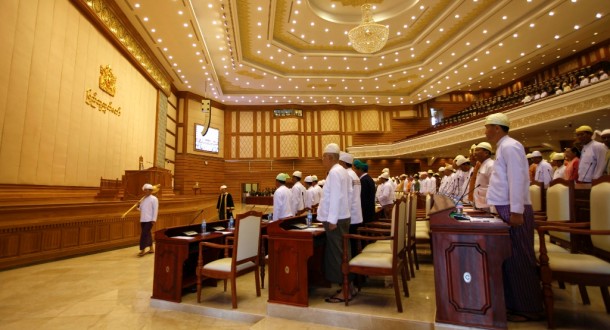Eighteen military-appointed MPs were sworn into Burma’s Upper and Lower Houses of Parliament during the opening day of the new legislative session in Naypyidaw on Thursday.
The Burmese armed forces appointed 13 colonels to the Lower House and five colonels to the Upper House in place of their similarly ranked incumbents, according to the state-run The New light of Myanmar. MPs say fresh military candidates are introduced to every parliamentary session.
Lower House Speaker Shwe Mann told MPs to propose more issues that would help the people during the new session and encouraged all to take part in proceedings.
“He told all MPs that they should not act based on personal or party interest but focus on national interest for all people in the country, and be brave enough to raise issues at Parliament,” said Khuang Ling, a Lower House MP for the Chin National Progressive Party.
Parliament will first take care of those remaining issues left over from the previous session, according to MPs. Some topics have already been broadly discussed without any decision having been made.
In particular, Burma’s new Foreign Direct Investment law still has not been passed as Burmese President Thein Sein has asked for a number of clarifications. Many international businesses are waiting to see this vital legislation before investing in the country.
Two issues were proposed at the Upper House of Parliament on Thursday morning, according to MPs. One concerned the salary of schools teachers and the second was regarding the right of appeal for those dismissed from government posts accused of corruption.
MPs are now preparing to raise various issues for discussion at Parliament. Khuang Ling said that he will propose the issue of local development in Falam Township of Chin State.
“I am preparing to propose two issues,” he told The Irrawaddy on Thursday. “We have had forced relocations as well as damage to property with the construction of the new road from Rangoon to Falam Towship. I want Parliament to discuss this. We also have a deprived hospital in our town. Those who are poor, they cannot get proper treatment—the local people especially have suffered a lot.”
Ethnic MPs say the democratic space has grown since the first session of Parliament as fewer candidates from the military or ruling Union Solidarity and Development Party (USDP) have been controlling the agenda and instead let minority parties have a say.
Nevertheless, critics say the new and undergoing democratic transition in Burma has many challenges including the issues of fighting in Kachin State and resettling homeless people in Arakan State.
A delegation of US officials met ethnic MPs in Naypyidaw before Thursday’s opening of Parliament in order to learn more about the current conditions in border areas before discussing the matter with Thein Sein.
Shwe Maung, a USDP MP representing Buthidaung Township in Arakan State, told the delegation that 573 Rohingya Muslims have been killed in the sectarian violence that has gripped western Burma since the end of May.
Dr. Aye Maung, an MP for the Rakhine Nationalities Development Party, rejected this figure by telling the meeting that accusations of atrocities were groundless. Official government figures put the number of dead from both sides at under 100.
Dwe Bu, an ethnic Kachin MP in Burma’s Lower House, asked the US delegation to help save civilian lives by putting pressure on the government to end fighting in northernmost Burma.
The Unity and Democracy Party member said that the situation on the ground was different from that described by Thein Sein during his recent trip to the US. Thein Sein said that government troops did not provoke clashes and only the rebel Kachin Independence Army fired first.
The US delegation includes senior representatives from the White House national security staff team, Defense Department officials, members of the Department of Homeland Security, Vikram Singh, the deputy assistant secretary of defense for South and Southeast Asia, and Lt-Gen Francis Wiercinski, head of the US Army’s Pacific Command.

















